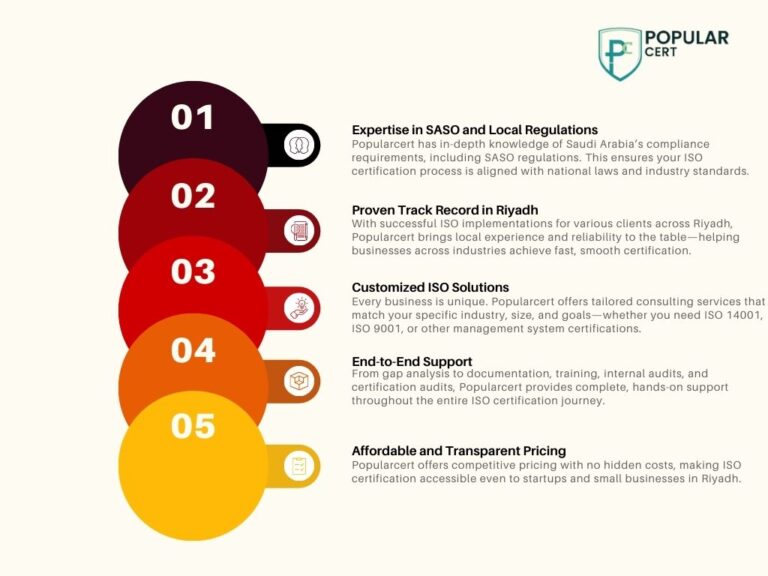How ISO 14001 Certification Guarantees Compliance with SASO in Riyadh?

As Saudi Arabia integrates into the global economy, environmental sustainability has become a critical focus for businesses in the region. Companies aiming to meet the environmental requirements of the Saudi Standards, Metrology and Quality Organization (SASO) will find ISO 14001 certification in Riyadh to be an invaluable asset
Understanding ISO 14001 and SASO Compliance
ISO 14001 is an internationally recognized standard for Environmental Management Systems (EMS). It provides a framework that organizations can follow to set up an effective EMS, helping them reduce their environmental impact and comply with applicable laws and regulations.
In Saudi Arabia, SASO plays a pivotal role in establishing and enforcing environmental standards. By aligning with ISO 14001, businesses can ensure they meet SASO’s stringent environmental requirements, thereby facilitating smoother operations and market access within the Kingdom.
Important Areas of Focus for SASO Compliance with ISO 14001 Certification:
Compliance with Regulatory Authorities and Legal Frameworks
ISO 14001 certification requires companies to comply with SASO regulations, local environmental laws, and international standards. The certification process includes a legal compliance review and periodic audits to ensure adherence to active legal obligations and mitigate potential risks.
Legal frameworks often mandate organizations to conduct environmental reviews to assess risks associated with their activities. Integrating SASO requirements into corporate environmental policies ensures national compliance while maintaining alignment with global standards.
Environmental Degradation and Resource Overuse Screening with Risk Mitigation Measures
Businesses implementing ISO 14001 often conduct baseline studies to evaluate the extent of environmental degradation and resource overuse. This proactive approach aligns with SASO and involves setting targets to improve environmental performance and enhance organizational reputation.
Through risk prevention assessments, organizations can identify existing and potential pollution sources, develop counteraction strategies, and implement mitigation measures. Adopting these practices is essential to prevent environmental damage and promote the sustainable use of resources.
Types Of Certification
- ISO Certification
- ISO 9001 Certification
- ISO 14001 Certification
- ISO 45001 Certification
- ISO 22000 Certification
- ISO 27001 Certification
- ISO 17025 Certification
- ISO 13485 Certification
- ISO 20000-1 Certification
- ISO 22301 Certification
- ISO 50001 Certification
- ISO 37001 Certification
- IATF 16949 Certification
- ISO 29001 Certification
- ISO 31000 Certification
- ISO 20121 Certification
- ISO 10002 Certification
- ISO 41001 Certification
Get Free Consultation
Our Clients


















Benefits of ISO 14001 Certification in Riyadh
- Regulatory Compliance: Achieving ISO 14001 certification ensures that your organization complies with local environmental laws and SASO regulations.
- Enhanced Corporate Image: Demonstrating a commitment to environmental responsibility can improve your company's reputation among customers, stakeholders, and regulators.
- Operational Efficiency: Implementing an EMS can lead to more efficient use of resources, reducing waste and operational costs
- Market Advantage: Certification can provide a competitive edge, especially when bidding for contracts that require adherence to environmental standards.

Improvement of Business Reputation and Market Opportunities:
- Gap Analysis: Assess your current environmental management practices against ISO 14001 requirements.
- Planning: Develop an implementation plan addressing identified gaps.
- Implementation: Establish and document processes to meet ISO 14001 standards.
- Internal Audit: Evaluate the effectiveness of the EMS and identify areas for improvement.
- Management Review: Ensure top management reviews the EMS for continued suitability and effectiveness.
- Certification Audit: Engage an accredited certification body to conduct the certification audit.
Employee Participation and Education:
A well-structured ISO 14001 framework fosters an environmentally conscious workplace culture. Organizations can leverage training programs, interactive workshops, and awareness campaigns to instill sustainability knowledge among employees.
Engaged employees play a pivotal role in environmental initiatives, contributing proactively to compliance with SASO standards. Their active participation strengthens the organization’s commitment to sustainability and continuous improvement.
Cutback of Operational Spending:
Cost efficiency is an additional advantage of ISO 14001 certification. Adopting sustainable resource management, energy-efficient operations, and responsible waste disposal reduces long-term operational expenses.
Investment in green technologies and eco-friendly business practices ensures regulatory compliance while enhancing productivity. These cost-saving measures optimize resource utilization and contribute to financial sustainability.
Conclusion:
ISO 14001 certification is a strategic asset for businesses in Riyadh seeking to align with SASO environmental standards. It provides a structured framework to manage environmental risks, enhance operational efficiency, and improve regulatory compliance. As Saudi Arabia continues its economic growth, integrating ISO 14001 not only ensures compliance but also enhances corporate sustainability and competitiveness.
Accredited certification bodies and environmental consultants simplify the certification process, ensuring seamless adherence to SASO standards. Popularcert is a trusted name in this field, offering expert guidance to businesses in Riyadh. Beyond compliance, ISO 14001 certification elevates corporate social responsibility, reinforces brand credibility, and strengthens market positioning.
GET A FREE CONSULTATION NOW
FAQ
What is ISO 14001 Certification?
ISO 14001 is a globally adopted standard for Environmental Management Systems (EMS) that permits companies to minimize their negative environmental impact and improve their ability to be sustainable
Who can apply for ISO 14001 Certification?
every organization, regardless of its total headcount or business area, is allowed to apply for the ISO 14001 certification in order to disclose progress toward environmental regulation and fulfillment.
How long does it take to get ISO 14001 certification?
The duration is not the same for all companies, it mostly depends on the company’s size and readiness, but the timeline is likely to be several weeks, on average from the starting of preparations to the issuance of a certificate.
What are the main benefits of ISO 14001?
ISO 14001 sets the standards for waste reduction, conformity to environmental regulations, reinforcement of the company’s reputation, promotion of sustainable business processes and the bringing about of a more efficient operation.
